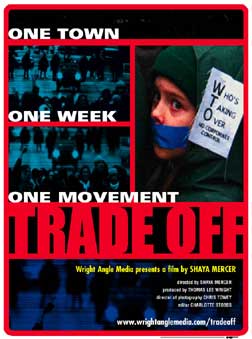
JR: With this film, are you aiming to galvanize activists, or to reach out to people who may not know much about this issue?
go to WASHINGTON FREE PRESS HOME (subscribe, contacts, archives, latest, etc.)
July/Aug 2000 issue (#46)
At the this year's Seattle International Film Festival, the audience award for Best Documentary went to Trade Off, which covers last year's WTO protests in Seattle. Although I paid close attention to those events, there was material in this film that was new to me.
Director Shaya Mercer is a Seattle native. As the following interview shows, making this film was not just a job for her.
JR: Do you have a background as a political activist?
SM: When I was a small child, my Mom took me on Vietnam marches. I was raised in a freethinking, liberal environment. Didn't study politics. One thing I really enjoyed about this project is the ability to explore my political self, as well as my filmmaking self. I used to have to choose my film career over every other aspect of my life. So it's been a pleasure to combine those two elements.
JR: The WTO galvanized many people who had not been previously active. Did the same thing happen with you?
SM: Absolutely. I was working a day job in New York with an environmental group. That's how I learned that the WTO existed in the first place. I started looking into their policies. Then I got a phone call from Tom [producer Thomas Lee Wright]. He'd been doing the same reading, and he knew 50,000 people were coming to Seattle. We knew we wanted to be involved and that we really should film it. We knew it was going to be historically important. We also had a sense that the issues would get lost in the mounting tension with the police department.

JR: With this film, are you aiming to galvanize activists, or to reach out to people who may not know much about this issue?
SM: Our goal from the beginning was to expand the education of the general public. We're not trying to preach to the converted. I wanted to share with people, not only what it was like to be on the streets, but why were people protesting in the first place. Because I don't think the general public had a keen awareness of how the policies of the WTO affect everything from the quality of our environment, the food we eat, the wages we earn, the future of jobs around the world, our very participation in the democratic process.
JR: Does globalization affect you as a filmmaker?
SM: Well, sure! You have large entertainment companies gobbling up small entertainment companies. So you have a very small number of corporations making cultural decisions, and because they have the broadest distribution channels and the most power, the blockbuster glossy entertainment coming out of Hollywood and New York is taking over the world.
As a filmmaker it has very much affected me; I had to move to New York because the film industry has been jumping over Seattle for locations in Canada. One of the things the industry is allowed to do with free trade agreements is go find the lowest wages and the best currency exchange rates. So absolutely it's had an affect on me personally and my friends, and the industry in general in Washington state.
JR: Let me tell you one thing that was cool to see in Trade Off. You have two French government officials talking to a protester. He was pointing out facts that these officials didn't seem to understand.
SM: We stumbled upon the French ministers in the Pike Place Market. While I was interviewing them a demonstrator walked up and started an impromptu street debate right in front of my cameras. It wasn't planned. If I was writing a film, I couldn't have written something like that. The French ministers--maybe they're holding on to some hope that parliaments and governments still have power. That's one of the major problems with the WTO.
JR: Have you seen any other documentaries in the Festival?
SM: I've seen only two films. One was a documentary. And that was Rebels With a Cause, about the Students for a Democratic Society. There were some pretty striking things. There's a huge parallel between the movement in the 60s and the movement now. It really is a continuation of the foundations that were laid in the 60s.
JR: You and the director of Rebels With a Cause made a similar choice--essentially no narration.
SM: It was very important to have the people speaking for themselves, not to manipulate the story through a particular point of view. To allow audiences to draw their own conclusions and to give voice to the voiceless--these groups that don't get the mainstream media spotlight.
JR: It helps when you've got articulate people like Mike Dolan (of Public Citizen).
SM: Oh, absolutely. We used the actual people involved to tell the story, and I think it was effective.
JR: Did you have anything to add?
SM: It's important for people to know that this isn't just about the street skirmish. This is about the issues that brought people to demonstrate in the first place. People will see things that will surprise them. They'll learn something, and hopefully come away better informed and potentially mobilized to participate on whatever level they see fit.
|
go to WASHINGTON FREE PRESS HOME |